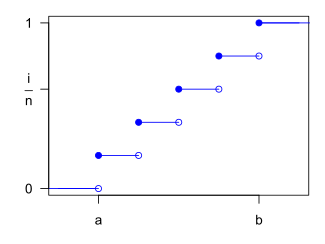
Back توزيع منتظم متقطع Arabic Distribución uniforme discreta AST Раўнамернае дыскрэтнае размеркаванне Byelorussian Distribució uniforme discreta Catalan Diskrete Gleichverteilung German Διακριτή ομοιόμορφη κατανομή Greek Diskreta unuforma distribuo Esperanto Distribución uniforme discreta Spanish Banaketa uniforme diskretu Basque توزیع یکنواخت گسسته Persian
This article needs additional citations for verification. (October 2022) |
|
Probability mass function  n = 5 where n = b − a + 1 | |||
|
Cumulative distribution function  | |||
| Notation | or | ||
|---|---|---|---|
| Parameters |
integers with | ||
| Support | |||
| PMF | |||
| CDF | |||
| Mean | |||
| Median | |||
| Mode | N/A | ||
| Variance | |||
| Skewness | |||
| Excess kurtosis | |||
| Entropy | |||
| MGF | |||
| CF | |||
| PGF | |||
In probability theory and statistics, the discrete uniform distribution is a symmetric probability distribution wherein a finite number of values are equally likely to be observed; every one of n values has equal probability 1/n. Another way of saying "discrete uniform distribution" would be "a known, finite number of outcomes equally likely to happen".
A simple example of the discrete uniform distribution is throwing a fair die. The possible values are 1, 2, 3, 4, 5, 6, and each time the die is thrown the probability of a given score is 1/6. If two dice are thrown and their values added, the resulting distribution is no longer uniform because not all sums have equal probability. Although it is convenient to describe discrete uniform distributions over integers, such as this, one can also consider discrete uniform distributions over any finite set. For instance, a random permutation is a permutation generated uniformly from the permutations of a given length, and a uniform spanning tree is a spanning tree generated uniformly from the spanning trees of a given graph.
The discrete uniform distribution itself is inherently non-parametric. It is convenient, however, to represent its values generally by all integers in an interval [a,b], so that a and b become the main parameters of the distribution (often one simply considers the interval [1,n] with the single parameter n). With these conventions, the cumulative distribution function (CDF) of the discrete uniform distribution can be expressed, for any k ∈ [a,b], as
© MMXXIII Rich X Search. We shall prevail. All rights reserved. Rich X Search
















